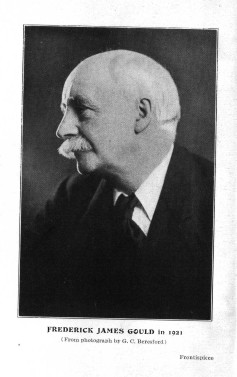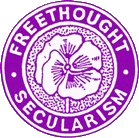F. J. Gould (1855 - 1938)

F. J. Gould Life Story extracts.
Born in Brighton but brought up in London, Frederick James Gould became a chorister at Windsor, and a religious teacher, but left this comfortable position to teach in the East End of London where he tried to reform religious teaching.
He became involved with Charles Watts in the Rationalist and Ethical movements, and was appointed Secretary to Leicester Secular Society in 1899 to 1908, during which time he was also elected as a Labour Councillor.
He was particularly interested in moral lessons without theology for children, and was invited to give a series of model lessons in America in 1911 and 1913-14 and in India, under Government auspices, in 1913.
After leaving Leicester Secular Society he joined the Positivist Church, first in Leicester, later in London, based on the teachings of Auguste Comte. But shortly after, in 1909, he was one of the first to adopt the term "Humanist".
Religion in Education
The following extract is from Vision and Realism: a hundred years of The Freethinker by Jim Herrick (1982), page 39.
Freethinkers were divided into those who wanted religion kept out of schools entirely and those who wanted broad teaching about morality, religion and humanity. The Freethinker and Foote usually took the former line, but a Moral Instruction League was founded in 1898 at a public meeting in which the NSS, the Freethought Federation, the ILP and other radical and ethical organisations took part. F. J. Gould was a vigorous proponent of "an Education inspired by Humanity's entire story — a story which includes the Bible and all other expressions of the genius of the race." (F. J. Gould's occasional "ethical sermons" were a colourful feature of the Freethinker during this period and indicate that its columns embraced a wide spectrum of the views of those whom Gould was already referring to as "us Humanists" as early as 1909 in an article proposing that "It is the highest maximum of the Religion of Humanity to live for others.")
A Concise History of Religions, (3 vols, 1893-7)
A History of Leicester Secular Society (1901).
The Life-Story of a Humanist, (Watts & Co, 1923).
Gould on Secularism
The following passage, attributed to F. J. Gould, is quoted in Fred Lee's thesis "Secularism from the Victorian age to the Twenty-first century: The History of the Leicester Secular Society". It was used by the Society in 1902 as one of three statements of its aims (the others were by Holyoake and Robertson).Secularism is that theory and practice of life which aim at developing man's physical, mental, and moral powers, without dependence on the doctrines of God and a spiritual world. It is a "theory" because it seeks to give a man clear ideas of what he ought to do in the world, and why he ought to do it. It teaches him to think for himself, and in co-operation with other people, about his place and duty. It is also a "practice". It asks a man to act as well as to think. Mere change of opinion cannot make a man a Secularist. He must have some definite purpose in his own moral and intellectual life. He must show a readiness to work with others for the common welfare.
Secularism regards reason as the supreme judge of human conduct. Reason will not try to take the place of the affections which are essential to the existence of the human race, but it should control and guide their action and so make them more useful and more dignified. By the aid of reason we can reflect on our experience and apply its lessons. Secularism declines to receive the Bible or any other so-called sacred book as a divine revelation. It freely criticises the creed of persons who accept the Bible as an infallible authority on science, history, or morals. Secularism considers that free discussion is essential to intellectual and moral progress. It maintains the freedom of the platform and the press, while counselling moderation of language and mutual respect among disputants.
Secularism demands adhesion to no political party or programme, but it is, by its very nature, progressive and liberal. Every consistent Secularist takes a practical interest in what is known as the social problem. This problem covers such serious subjects as poverty, overcrowding, disputes between capital and labour, the drink question, the gambling evil, the lowering effects of certain classes of literature and amusements, etc. Members of a Secular society may be Socialists or Individualists, or they may hold other forms of political opinion. But it is fair to expect that, in some way or other, they should show their active interest in the solution of the social problem, and not be content with mere ideas.
Secularists, having set aside the doctrine of an over-ruling providence, are bound to concentrate their attention on the natural causes of pain and social disorder, and should therefore encourage the careful and systematic (i.e. scientific) study of nature in general, and of human nature in particular. Secularism is necessarily democratic in its sympathies. Its first principle -- that Reason should be the supreme judge of human conduct -- strikes at the principle of government by caste or class, either in the ordinary life of society, or in matters intellectual, or in the sphere of religion.
On the principle of democracy, the equality of the sexes must be admitted, and this equality will carry with it a willingness to open to women all occupations in which experience proves their usefulness, and to bestow upon them all such legal rights as the welfare of society demands.
In no direction should Secularism make its influence felt more than in that of education in all grades. It should strive to release education from all connection with supernaturalism and theology, and to make moral and civil training its leading aim. Secularism, both by its freedom from theological bias, and its sympathy with democracy, is peculiarly fitted for the advocacy of international peace.
Page updated 22 October 2016 JRC









